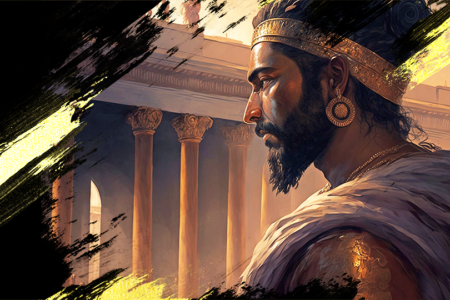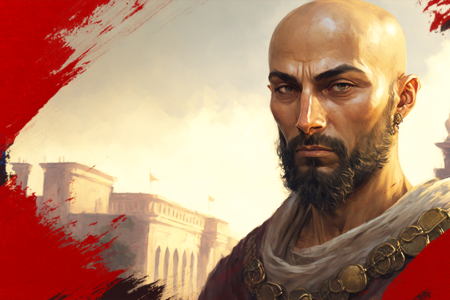Esther
She was young and beautiful, but her courage was her crowning glory.
When I was a kid, watching the Miss America Pageant on TV was a big deal in our home. The competition symbolized everything we knew back then about beauty, glitz, glamor, and fame and was an experience most little girls dreamed about.
In those days, Americans watched with breathless anticipation to see which contestant would be the one to walk the runway with the crown on her head, the sash over one shoulder, and camera bulbs flashing as Bert Parks sang “There She Is, Miss America” by songwriter Bernie Wayne.
But that’s not the way things happened for Esther or any of the “contestants” in the “Miss Persia Pageant” of 479 BC. Queen Vashti had displeased her husband, King Ahasuerus (Xerxes I), who banished her from the kingdom. Word then went out the king was looking for a replacement, and he sent his men to find one.
The girls were probably in their mid-to-late teens when they were snatched from their homes by the king’s commissioners whose orders were to bring back beautiful, young virgins. Although some of the girls may have thought it a privilege to be picked, most probably were terrified. After spending one night with the king, they were doomed to join his vast harem, with no hope of homes and families of their own.
Her Wise, Submissive Spirit
Esther’s Hebrew name was Hadassah. We know nothing about her father or mother except that they had not returned to Judah when the opportunity presented itself and, in fact, were probably dead (Est. 2:7).
Mordecai, Esther’s cousin, who was much older than Esther, reared her as his own daughter. He, too, remained in the land of captivity with no apparent plans to return to his own country.
Interestingly, there is no record of Esther’s or Mordecai’s godliness, although Mordecai appeared to be honest, wise, and solicitous about Esther; and he understood a providential hand worked behind the events unfolding. They both may have realized what it meant to be Jewish in a foreign land (a risky business throughout history) because Mordecai told Esther not to reveal her Jewishness, and she obeyed. So, a certain amount of anxiety and guardedness may have characterized their lives.
We know Esther was an exceptionally beautiful virgin, or the king’s officers would not have snatched her. But, apparently, she also had an inward beauty because she “obtained favor in the sight of all who saw her” (v. 15). She was well-liked by everyone, including Hegai, the king’s eunuch in charge of the harem.
When her time came to go to the king following a year of beauty treatments, “she requested nothing but what Hegai . . . , the custodian of the women, advised” (v. 15). She was smart enough to know Hegai knew his business, and she submitted to his wise counsel.
Clearly, Esther was not headstrong or wise in her own eyes and carefully considered the advice of a counselor. The phrase favor in the sight of all who saw her also implies the other girls in the harem, as well as the palace workers, found her warm and personable and wanted to be near her.
Scripture says when it was Esther’s turn to be with the king, he was more pleased with her than with any of the others; and he made her queen—queen of the vastest empire in the world at that time and the empire that ruled over all of world Jewry.
Esther’s new position did not change who she was or whom she loved. She remained loyal to Mordecai and showed great wisdom when her time of testing arrived.
Her Courage
Esther is best known for her bravery in approaching the king, risking her own life to save her people.
When Mordecai heard that all the Jews in the kingdom would be murdered on the 13th of Adar, he “tore his clothes and put on sackcloth and ashes”; went to the king’s gate; and cried aloud (4:1–2). Esther’s servants told her what was happening. “Deeply distressed,” she sent clothes to Mordecai, which he refused (v. 4).
Evidently, Esther was never allowed to leave the palace. She communicated with Mordecai through Hathach, who went back and forth between the two with messages. Consequently, Hathach must have learned Esther was Jewish; but he faithfully kept her confidence.
Mordecai wanted Esther to ask Ahasuerus to rescue her people. Her initial reaction was fear for her own life: “He has but one law: put all to death, except the one to whom the king holds out the golden scepter, that he may live. Yet I myself have not been called to go in to the king these thirty days” (v. 11).
Mordecai’s response was blunt and challenging and is the most famous passage in the book of Esther:
Do not think in your heart that you will escape in the king’s palace any more than all the other Jews. For if you remain completely silent at this time, relief and deliverance will arise for the Jews from another place, but you and your father’s house will perish. Yet who knows whether you have come to the kingdom for such a time as this? (vv. 13–14).
When Esther sent back her reply to Mordecai, she was resolute and unflinching. She would do as Mordecai requested, boldly declaring, “If I perish, I perish!” (v. 16).
The Bible does not dwell on the moment Ahasuerus extended his scepter, but it had to have been one of staggering relief to the young queen. In fact, the king received her so favorably he offered to grant any request of hers up to half his kingdom, which was the largest, most powerful kingdom on Earth. But Esther seemed unaffected by the offer. She was focused on one thing only: rescuing her people.
In her wisdom, she had devised a plan. First, she told Mordecai to have all the Jews in Shushan fast for three days; and she and her maids would do the same. Then she invited the king and Haman, the antisemite who had engineered the Jews’ demise, to a feast.
At the feast, the king again asked for her request. But instead, Esther invited them both to another feast. She obviously knew the king well enough to know what he would enjoy; and she showed patience, discretion, and wisdom in her timing.
Her banquets not only put the king in a good mood but also gave her opportunity to prepare herself mentally and emotionally for what she was about to ask of him. She was careful; deliberate; and, in the end, successful. Haman was executed; and the Jewish people were allowed to defend themselves and “to destroy, kill, and annihilate all the forces of any people or province that would assault them” (8:11).
Her Mystery
Esther does not appear to have been a spiritual giant, specifically devoted to God. Apart from the fast she called, there is no direct evidence she was religious. Fervent prayer being the purpose of fasting is never mentioned.
However, it could be the writer of Esther intentionally never mentioned prayer for the same reason he never mentioned God; but God’s providence clearly shines through. Or it’s possible Esther had no relationship with Yahweh. Some details about Esther remain a mystery.
We also don’t know how long Esther lived or if she had children. We do know she was queen for 14 years at the most because Ahasuerus was murdered in 465 BC by the commander of the royal bodyguard with the help of a eunuch.
No matter, Esther had qualities we all would do well to emulate. Even when weak and fearful, she was strong and brave. Her story is inspiring and motivating and shows how God is at the center of everything in the universe—with an especially protective eye on His Chosen People, Israel.
Esther was not your typical beauty queen, but there is beauty in her story—the beauty of a sovereign, covenant-keeping God whose promises are eternal and whose Word stands forever.









I want to learn more on characters in bible. brings more understanding.